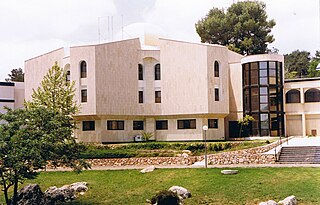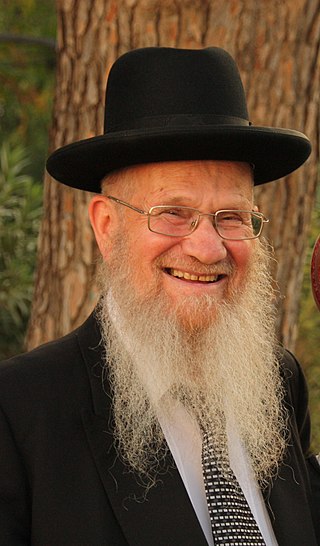
Yitzchak Hutner, also known as Isaac Hutner, was an American Orthodox rabbi and rosh yeshiva (dean).

Hebron Yeshiva, also known as Yeshivas Hevron, or Knesses Yisroel, is a yeshiva. It originated in 1924 when the roshei yeshiva (deans) and 150 students of the Slabodka Yeshiva, known colloquially as the "mother of yeshivas", relocated to Hebron.

Yeshiva Rabbi Chaim Berlin or Yeshivas Rabbeinu Chaim Berlin is an American Haredi Lithuanian-type boys' and men's yeshiva in Brooklyn, New York.
Rosh yeshiva is the title given to the dean of a yeshiva, a Jewish educational institution that focuses on the study of traditional religious texts, primarily the Talmud and the Torah, and halakha.
A mashgiach ruchani, sometimes mashgiach for short, is a spiritual supervisor or guide. They are usually a rabbi who has an official position within a yeshiva and is responsible for the non-academic areas of yeshiva students' lives.

Yeshivat HaKotel is a religious Zionist Hesder yeshiva in the Old City of Jerusalem, opposite the Temple Mount and overlooking the Kotel, hence its name. Most of the students are in the Israeli Hesder program which combines at least fifteen months of army service with several years of Yeshiva study.

Yeshivat Ma'alot Ya'akov is a Hesder Yeshiva, founded in 1975 in the town of Maalot following the Ma'alot massacre. The Yeshiva is named after Rabbi Dr. Ya'akov Herzog, son of the late Chief Rabbi of Israel Yitzhak HaLevi Herzog and brother of the late President of Israel Chaim Herzog. The Rosh Yeshiva is Rabbi Yehoshua Weitzman.

Har HaMenuchot is the largest cemetery in Jerusalem. The hilltop burial ground lies at the western edge of the city adjacent to the neighborhood of Givat Shaul, with commanding views of Mevaseret Zion to the north, Motza to the west, and Har Nof to the south. Opened in 1951 on 300 dunams of land, it has continually expanded into new sections on the northern and western slopes of the hill. As of 2008, the cemetery encompasses 580 dunams in which over 150,000 people are buried.

The Mir Yeshiva, known also as The Mir, is an Orthodox Jewish yeshiva in Beit Yisrael, Jerusalem. With over 9,000 single and married students, it is the largest yeshiva in the world. Most students are from Israel and the United States, with many from other parts of the world such as Belgium, France, the United Kingdom, Mexico, Switzerland, Argentina, Australia, Russia, Canada and Panama.

The Mir Yeshiva, commonly known as the Mirrer Yeshiva or The Mir, was a Lithuanian yeshiva located in the town of Mir, Russian Empire. After relocating a number of times during World War II, it has evolved into three yeshivas: one in Jerusalem and two in Brooklyn, New York: the Mir Yeshiva, and Bais Hatalmud.

Yitzhak Ernst Nebenzahl was appointed State Comptroller of the State of Israel after the establishment of the state in 1948. He served as State Comptroller and Ombudsman from 1961–1981.
Chizkiyahu Nebenzahl is the current Rabbi of the Old City of Jerusalem.
Yeshivat Netiv Aryeh is a Religious Zionist yeshiva located at the Western Wall Plaza in the Old City of Jerusalem.
Rabbi Nochum Partzovitz was a rabbi and Rosh Yeshiva of Yeshivas Mir, the largest Yeshiva in the word at the time. He is known worldwide for erudite explanations of Talmudic topics.

Aryeh Finkel (1931–2016) was a Haredi rabbi and rosh yeshiva of the Mir Brachfeld branch of the Mir Yeshiva. Before assuming his post at the new yeshiva branch in 2005, he served as the Mashgiach at the Mir in Jerusalem for many decades.

Yeshivas Knesses Yisrael was a yeshiva located in the town of Vilijampolės Slabada in the Kovno Governorate of Russian Empire. It functioned from the late 19th century until World War II.

Yeshivas Itri is an Orthodox yeshiva in southeast Jerusalem. Founded in 1968 by Rabbi Mordechai Elefant, the yeshiva has several branches in Israel and the United States, and spawned several educational programs for Diaspora Jews.

Yeshayahu Hadari was an Israeli rabbi. He served as the first rosh yeshiva of Yeshivat HaKotel, a position he held for over thirty years.














